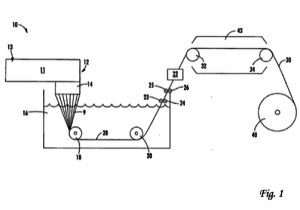 Patent law heavily involves interpretation of language. In addition to the construction of the claims themselves, it has an almost unintelligible set of rules for distinguishing licenses from assignments and special rules for the language one must use to assign a patent. But in Fort. v. Innegra Technologies, LLC, we have a more interesting situation, where the outcome is a question, not of contract language, but contract performance.
Patent law heavily involves interpretation of language. In addition to the construction of the claims themselves, it has an almost unintelligible set of rules for distinguishing licenses from assignments and special rules for the language one must use to assign a patent. But in Fort. v. Innegra Technologies, LLC, we have a more interesting situation, where the outcome is a question, not of contract language, but contract performance.
Brian Morin was the founder and president of NMFC, LLC, formerly known as Innegrity, LLC. He was also an inventor and employee. In 2004 he assigned a grandparent patent application, including “all divisions, and continuations thereof …”, to NMFC. In 2008, he entered into an employment agreement where he would receive a base salary of $140,000 and in which he automatically assigned any inventions.
In 2009, Morin’s salary was cut by 15%. He then invented an improvement to the original patent application and the company filed the ‘007 Application, which was a continuation-in-part of a divisional of the original application. But Morin refused to execute the assignment and a year later he was fired, after which he filed suit in state court for failure to pay wages and breach of the employment agreement. BB&T bank then sold all of NMFC’s assets, including all patents and applications, to defendant Innegra Technologies in a UCC sale. Innegra then filed a state court action asking for a declaratory judgment against Morin that Innegra was the patent owner, not Morin. NMFC filed for bankruptcy under Chapter 7 and, amidst other procedural maneuvers, Morin assigned the ‘007 Application the bankruptcy trustee. He said this about why:
Well, I can’t assign any rights that I don’t have. And I didn’t know if I had any, but to the extent that I had any, I didn’t want them. My position is that I don’t have any rights to it, and the only person I had ever assigned it to was Innegrity, LLC. So I assigned it to Innegrity, LLC, and if somebody else wanted to contend whether or not they owned it, I didn’t care because I had contracted to assign it to Innegrity.
This opinion is from bankruptcy court, with the trustee seeking declaratory judgment against Innegra that the NMFC estate is the owner of the ‘007 application. It boils down to answering a simple question—who owned the ‘007 Application on September 7, 2011, the date of the BB&T sale? If it was NMFC, then the patent application was sold to Innegra. If it was Morin, then the trustee owns it, by assignment from Morin.
It turns out to be a straight-up application of the law of contract performance. The trustee claimed that Morin was the owner on that date because NMFC had already breached the employment agreement by reducing his salary, excusing Morin performance on the assignment.
And we go back to contract class. The failure to pay Morin his full salary wasn’t a breach that excused his performance of the patent assignment; in fact there wasn’t even enough evidence to survive summary judgment. There was no breach because the salary terms were modified with Morin’s agreement or acquiescence:
The facts supporting this conclusion include Morin’s deposition testimony that he agreed to the pay reduction; his written acknowledgment of the pay reduction; his testimony that as of October 30, 2009, he had no expectation that Debtor would breach his Employment Agreement at all or to the extent that they did; his continued employment for more than a year following the pay reduction; the absence of a reference to the April 15, 2009 pay reduction in Morin’s State Court Complaint (other than his pursuit of past due wages, which is consistent with his agreement to have his remaining salary accrue as a debt); Morin’s testimony where he agreed that he chose to enforce and not rescind the Employment Agreement; Morin’s communication and cooperation with Debtor’s lawyer to file the 007 Application, which listed Debtor as the assignee; and Morin waiting until after the filing of his State Court Complaint and the BB & T Sale to file a change of correspondence with the U.S. Patent Office to have correspondence regarding the 007 Application directed to him instead of Debtor.
Morin also hadn’t asked for rescission as a remedy at the time of the breach: while he refused to execute the agreement, he also said he chose to enforce and not rescind the contract, thus failing to give the prompt, unequivocal notice that he considered his obligations under the agreement suspended as required for rescission. Claiming a breach now is also contrary to his state court litigation, where he claimed the employment agreement was valid and enforceable. So the owner of the patent at the time of the BB&T sale was NMFC and therefore Innegra acquired the patent in the sale.
The patent was also assigned by the original language in the 2004 assignment—the trustee argued that the assignment language that talked about the assignment of “continuation” applications didn’t include continuations-in-part. The court didn’t buy it, “The Trustee does not identify any cases where courts have held that an assignment must specifically reference the term ‘continuation-in-part’ to effectively assign rights to a continuation-in-part.”
Fort v. Innegra Tech. LLC, C/A No. 11-06800-JW/ Adv. Pro. No. 13-80138-JW (Jan. 13, 2015).

The text of this work is licensed under a Creative Commons Attribution-No Derivative Works 3.0 United States License.

Leave a Reply